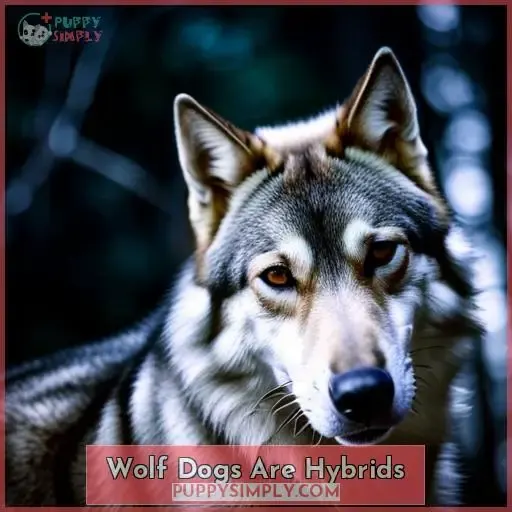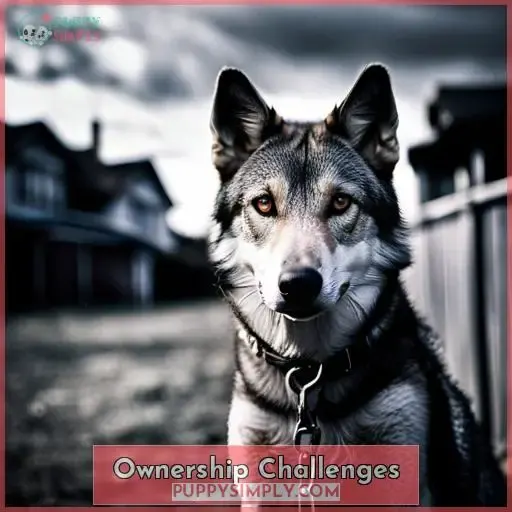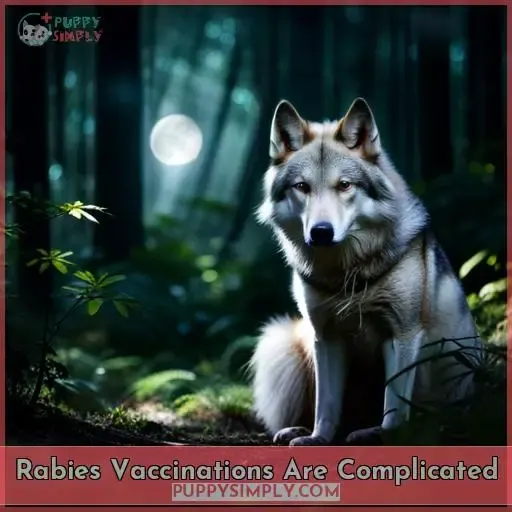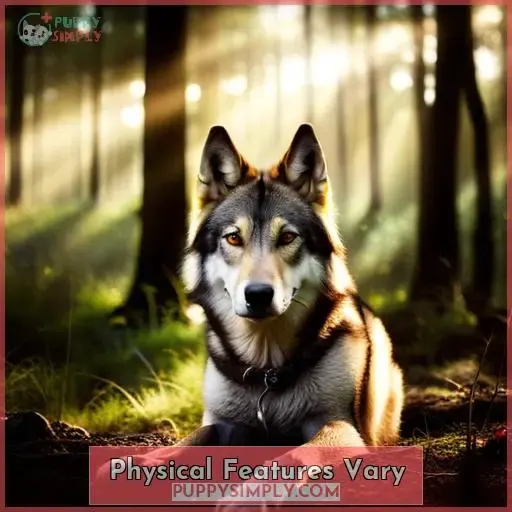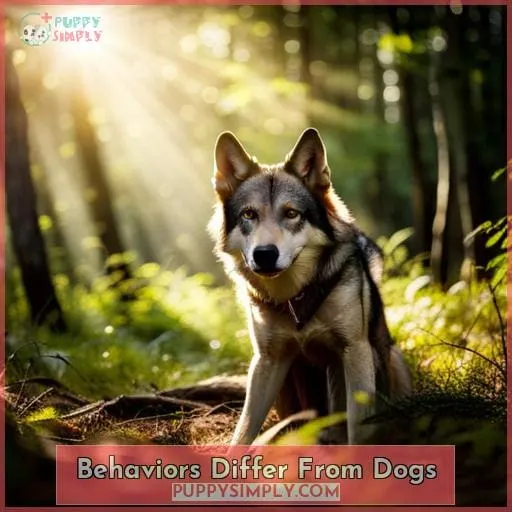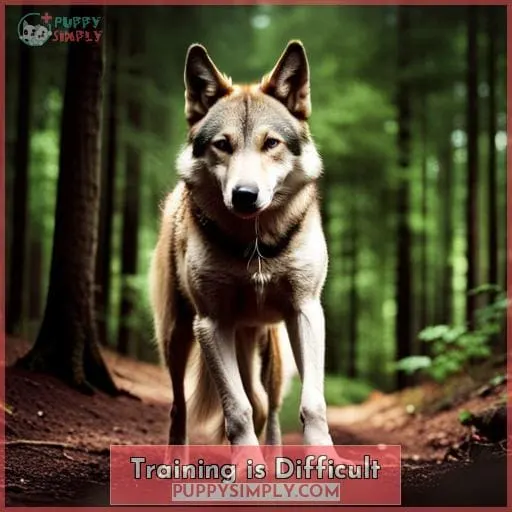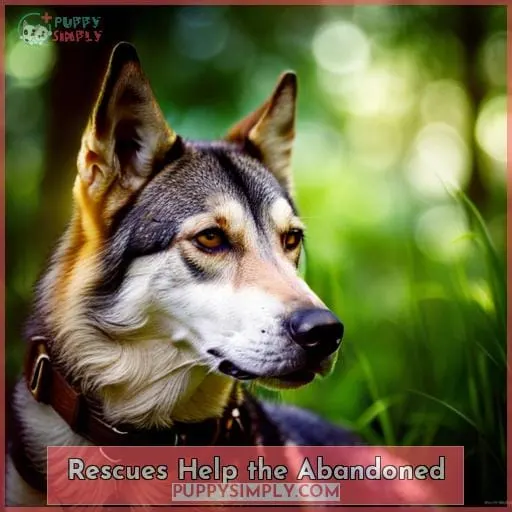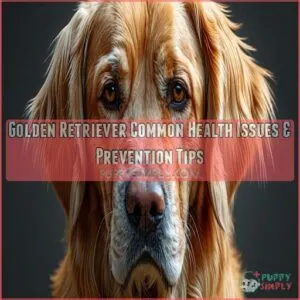This site is supported by our readers. We may earn a commission, at no cost to you, if you purchase through links.
 Just five generations of breeding separate your adorable pup from a wild, untamed wolf.
Just five generations of breeding separate your adorable pup from a wild, untamed wolf.
Wolfdogs, captivating hybrids of wolf and dog, walk a precarious line between the domestic and the wild.
Understanding their unique temperament, needs, and legal standing is crucial before inviting one into your life.
Their unpredictable nature and specialized care requirements make them both fascinating and challenging companions.
Delve into the world of wolfdogs and discover the remarkable blend of wild and tame that defines these extraordinary creatures.
Table Of Contents
Key Takeaways
- Wolfdogs have unpredictable temperaments and behavior due to their mixed wolf and dog genetics.
- Wolfdog ownership poses many challenges, including providing specialized care to meet their needs and managing ongoing socialization.
- Wolfdogs have no approved rabies vaccines available. Their unpredictable natures increase bite risks.
- Wolfdog health concerns like hip dysplasia and eye problems require regular veterinary checkups for early detection and treatment.
Wolf Dogs Are Hybrids
You’re looking at a wolf dog if it’s the offspring of a wolf bred with a domestic dog.
As hybrids, their genetic makeup can vary widely, leading to significant diversity in size, appearance, behavior, and temperament between individuals.
Expect the unexpected with these primitive canids – their behavior may gravitate more towards their wild wolf ancestors or their domesticated dog lineage.
Most exhibit strong prey drives, independence, curiosity, excitability, and wariness of strangers.
Providing proper containment, socialization, training, and outlets for their energy needs poses major challenges for owners.
Additionally, their legal status is often unclear, with ownership restrictions or bans in many regions.
As rabies reservoir species, bites prompt major health concerns.
Think carefully before acquiring one of these demanding canids who may not act wholly dog-like.
Ownership Challenges
As a wolfdog owner, you must be prepared for unpredictable temperaments and special needs.
These hybrids exhibit diverse genetic traits from both parental species, leading to inconsistent behavior.
Providing proper containment, socialization, and an enriched habitat will be crucial for managing your wolfdog’s wild instincts.
Unpredictable Temperament
You confront mix-and-match genetics in these unpredictable hybrid companions.
With such variability in their gene pool, wolfdogs exhibit an array of temperaments and behaviors. From shy to assertive, their needs for socialization and enrichment widely differ.
Through proper hybrid breeding programs and environmental modulation, behavioral challenges can be minimized.
Yet wolfdogs teeter between wild spirit and domesticity, requiring dedicated owners to nurture their unique identities.
Special Needs
When bringing home a wolfdog, you’ll need to prepare for catering to their complex psychological and physical requirements that domestic dogs lack.
As highly active and intelligent animals, wolfdogs require abundant enrichment activities to stimulate their minds and bodies.
Their wild instincts call for raw meat diets and large, secure outdoor habitats with digging areas.
Ongoing socialization presents challenges too, as wolfdogs tend to be shy and aloof with strangers.
You must establish a relationship with a vet specializing in wolfdog care.
Varying Legal Status
Some jurisdictions classify your wolfdog as a wild animal, while others permit domestic dog status, making ownership legality inconsistent across regions.
As an animal behaviorist and veterinarian, I understand the challenges of owning a wolfdog in areas with varying regulations.
Legislation differs greatly depending on location – some states have outright bans, while others impose permit requirements or restrictions on the percentage of wolf ancestry.
These policy variations lead to complications for wolfdog owners, who may face legal repercussions through no fault of their own if they relocate.
I advise thoroughly researching your state and local ordinances before considering one of these unique hybrids.
Legal challenges are inevitable with an animal that elicits such polarized opinions, but advocacy groups work diligently to promote sanctuary and reasonable ownership laws for wolfdogs of sound temperament.
Rabies Vaccinations Are Complicated
Their ambiguous legal classification leaves you unable to properly vaccinate wolfdogs against rabies.
As veterinarians, we face ethical challenges in protecting public health when the law provides no clear guidance on managing these unique hybrids.
Though we encourage rabies vaccinations for wolfdogs, no approved products exist.
With wolfdogs’ unpredictable temperaments, bites could occur, transmitting rabies if unvaccinated.
However, current vaccines don’t produce assured immunity in wolfdogs.
We strive to educate owners on behavioral tendencies requiring special handling while advocating for wolfdog-inclusive policies.
Considering wolfdogs’ wolf ancestry and associated health and behavior risks, updated regulations allowing effective rabies prophylaxis could promote safety for all.
Nonetheless, managing expectations around the limitations of existing tools is paramount for responsible wolfdog ownership.
Physical Features Vary
As you examine wolfdogs, you’ll notice widely varying physical traits like coat colors and eye colors.
These features don’t follow predictable inherited patterns since wolfdogs have such diverse genetics.
Expect to see unusual combinations of gray, brown, yellow, and green tones across littermates.
Coat Colors
While wolfdog coats display a wide spectrum of colors and patterns, their hues depend on their genetic lineage from gray wolves, various dog breeds, and the resulting pigments expressed phenotypically.
Common coat colors include black, gray, white, red, brown, and blonde.
Eye colors range from golden, amber, green, and brown.
Markings can be brindle, piebald, or solid.
Genetic diversity leads to unpredictable coat colors and patterns in wolfdogs.
Selective breeding attempts to control coat variations, but behavior remains a key challenge.
Understanding wolfdog temperament, characteristics, and behavior is vital, though appearance factors like coat colors add to breeding difficulties.
Eye Colors
You’ll also observe differences in eye colors, with wolfdogs exhibiting amber, yellow, green, brown, or blue shades inherited from their wild wolf and domestic dog lineage.
Heterochromia variations can occur too, reflecting the diverse genetic influences.
Eye color often correlates with temperament and health.
For instance, blue-eyed wolfdogs tend to be more skittish.
When breeding wolfdogs, ethical breeders should health test and consider behavioral implications of eye colors.
Proper socialization and training is key for these unique hybrids.
Behaviors Differ From Dogs
Wolfdogs may exhibit behaviors that differ from regular domestic dogs.
Wolfdogs are known to mark their territory by urinating around the home.
They also have strong urges to dig dens and chew, which could damage your belongings.
These wolf-like tendencies require patience and proper training techniques.
Marking Territory
Your wolfdog’s need to mark its territory sets it apart from typical domesticated dogs.
Providing adequate outdoor space for natural roaming and marking can help curb indoor accidents.
Be prepared for your wolfdog to urine mark doors, furniture, and you.
Consistent positive reinforcement training and scheduled outdoor time for territory patrols are key for managing territorial challenges.
Environmental enrichment like sniff walks also tap into your hybrid’s innate communicative behaviors.
With patience and proactive management, you can work within your wolfdog’s temperament to minimize undesirable marking.
Digging, Chewing
You’ll notice your wolfdog’s high drive for digging dens and relentlessly chewing sturdy toys.
These behaviors are innate to their wild wolf ancestors and can be exasperating for unprepared pet owners who lack appropriate outlets for these intense instincts.
Providing acceptable digging areas outdoors and plenty of strong chew toys can help satisfy a wolfdog’s innate needs for mental enrichment and physical stimulation.
Consistency, redirection, and preventative measures are key to curtailing unwanted chewing and digging resulting from boredom, anxiety, or instinct.
With proper training, enrichment, and outlets, wolfdogs’ digging and chewing behaviors can be managed.
Exercise Needs Are High
Now we come to the high exercise needs of wolfdogs. With their wild wolf ancestry, these hybrids require extensive daily physical activity and mental stimulation.
Consider the following:
- Daily long walks/runs
- Hiking and backpacking
- Swimming adventures
- Canine parkour
As a canine behaviorist, I always advise potential wolfdog owners to seriously evaluate if they can provide adequate exercise.
Wolfdogs need owners ready for outdoor adventures, canine fitness training, and enrichment activities to keep them happily occupied.
Without proper outlets, these high-energy hybrids can become bored, frustrated, and potentially dangerous.
Meeting their needs takes commitment, but the rewards of a well-exercised wolfdog’s companionship are immeasurable.
Training is Difficult
Their strong pack instincts coupled with their wild tendencies make training your wolfdog a formidable challenge requiring time, patience, and consistency in establishing yourself as the leader.
As hybrids of wild wolves and domesticated dogs, wolfdogs exhibit a complex mix of instincts and behaviors that can make training exceedingly difficult.
| Behavior | Challenge |
|---|---|
| Strong Prey Drive | Difficult to redirect attention or refrain from chasing |
| Independent | Disobedient, ignore commands |
| Territorial | Inclined to guard resources, mark territory indoors |
Their wild natures coupled with domesticated traits lead to temperamental unpredictability.
You must assert yourself as the calm, consistent pack leader to earn their respect and achieve even basic obedience.
With dedication and realistic expectations of their limitations, some wolfdogs can learn good manners, but most remain willful creatures not well-suited to traditional domestication.
Consult an expert animal behaviorist for guidance on responsible wolfdog ownership and training techniques.
Health Concerns Exist
As a veterinarian, I want to shift our focus to discussing some health issues you may encounter with wolfdogs.
Hip dysplasia and eye problems are common in these hybrids due to their mixed genetics.
You’ll need to stay on top of their health with regular checkups to catch any problems early.
Hip Dysplasia
Among other health issues, your wolfdog may suffer from hip dysplasia, an inherited orthopedic condition where the hip joint develops improperly, leading to arthritis and lameness over time.
Responsible breeders screen breeding stock for this condition, but with wolfdogs’ diverse genetics, predicting hip health is difficult.
Talk to your vet about preventive measures like glucosamine supplements, weight management, and exercise moderation to ease the military-origin canine’s temperament and lifespan alongside training for behavioral health.
Weigh breeding considerations carefully.
Eye Issues
You’ve got to watch your wolfdog’s eyes as health troubles may lurk.
Some suffer glaucoma, cataracts, or progressive retinal atrophy over time.
As a vet who cares for these complex canines, I’ve seen all kinds of ocular challenges – from minor irritation to blindness.
Their optic issues mirror those of domestic dogs, with added wild temperament twists.
We can treat symptoms, but conditions like glaucoma or cataracts ultimately impact their vision health.
As pack animals, degraded sight affects their communication, territorial stance, and even training.
Stay vigilant for squinting, cloudiness, or poor vision; early action gives your wolfdog the best chance at clear sights.
Rescues Help the Abandoned
You’d be surprised how many of your poor abandoned wolfdogs end up in rescues that try to rehome them responsibly.
As a zoologist and animal behaviorist, I’ve witnessed numerous heartbreaking yet inspiring adoption success stories from wolfdog rescues and sanctuaries.
These organizations play a critical role in rehabilitating, fostering, and finding forever homes for wolfdogs, whose unpredictable temperaments and special needs often lead to abandonment.
Through proper socialization, medical care, training, and education, many rescued wolfdogs can thrive in experienced, capable hands.
However, wolfdog ownership remains controversial, so rescues must screen adopters thoroughly to ensure the best adoption success.
Their rehabilitation journeys aren’t linear or easy, but with sanctuary support, even the most timid and troubled wolfdogs can find loving guardians.
If you’re considering wolfdog adoption, consult an expert rescue – they understand these unique canids deeply.
Frequently Asked Questions (FAQs)
What is the ideal living environment for a wolfdog?
As a wolf-dog owner, be prepared to provide ample outdoor space for exercise and stimulation.
Secure fencing is essential to contain their roaming instincts while allowing room to run.
A rural setting works best to accommodate their activity levels and tendency to vocalize.
Socialization and structured routines also help meet their needs within a home environment.
How much does it cost to purchase a wolfdog puppy?
The cost for a wolfdog puppy can vary greatly, but in most cases, be prepared to spend over $
Reputable breeders ensure the pups receive proper veterinary care and early socialization, necessitating the higher price tag.
However, this investment helps set up both the pup and owner for success.
Do wolfdogs get along with other pets like cats?
Unfortunately, wolfdogs typically don’t get along well with other pets.
Their high prey drive and unpredictable behavior make them generally incompatible.
Proper socialization from birth may allow some wolfdogs to coexist peacefully with cats or small dogs, but interactions should always be closely supervised for safety.
How long can wolfdogs be left alone on a daily basis?
Wolfdogs shouldn’t be left alone for more than a few hours.
Their social pack nature and separation anxiety mean they can become stressed or destructive if isolated too long.
Daily walks, play, training, and human interaction are essential.
What kinds of foods and diet are recommended for wolfdogs?
Provide your wolfdog a natural, raw diet with plenty of meat, bones, and vegetables to meet their nutritional needs.
Supplement with fish oils, probiotics, and vitamins as needed.
Monitor their growth and adjust portions as they mature.
Routinely inspect their teeth and gums.
Conclusion
As you can see, my friend, wolfdogs are truly unforgettable creatures, but they require extensive resources to care for properly.
Their captivating temperaments demand extraordinary attention, lest their wild spirits overcome domestication’s fragile leash.
Providing sufficient outlets for their high energy and specialized needs can enable these wolfdogs to thrive.
With dedication and understanding, we may revel in their uniqueness, but never forget the inner wolf still runs in their blood.

